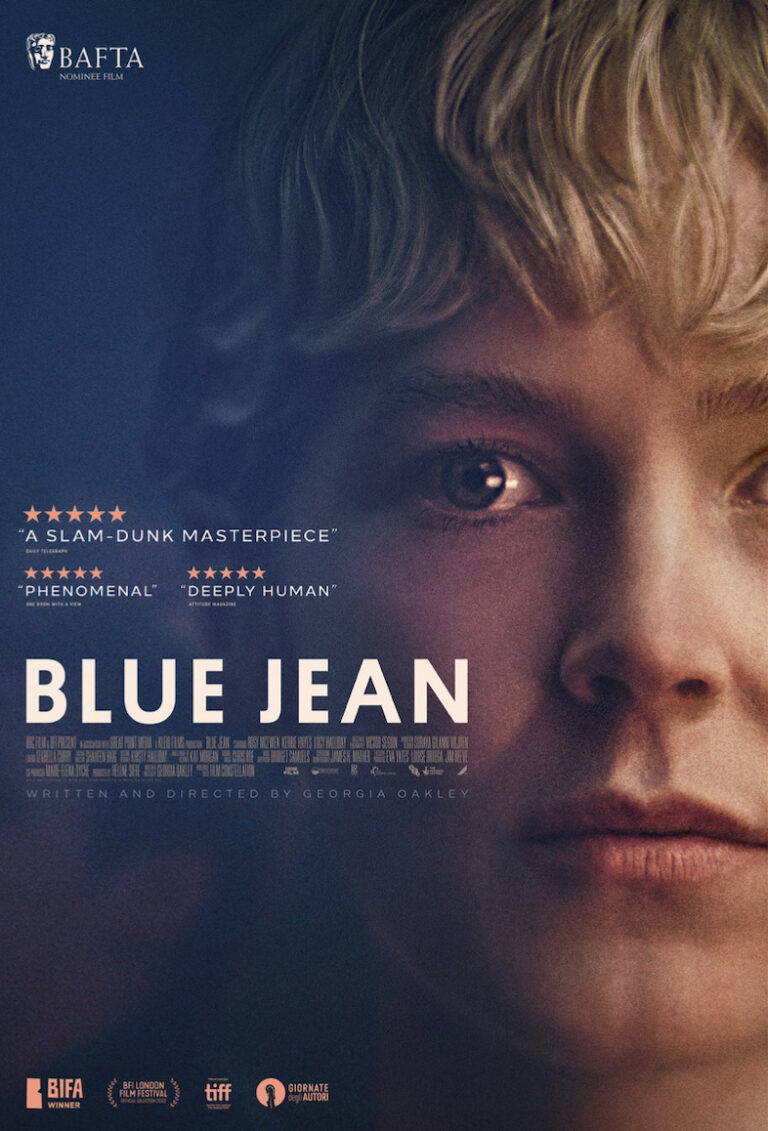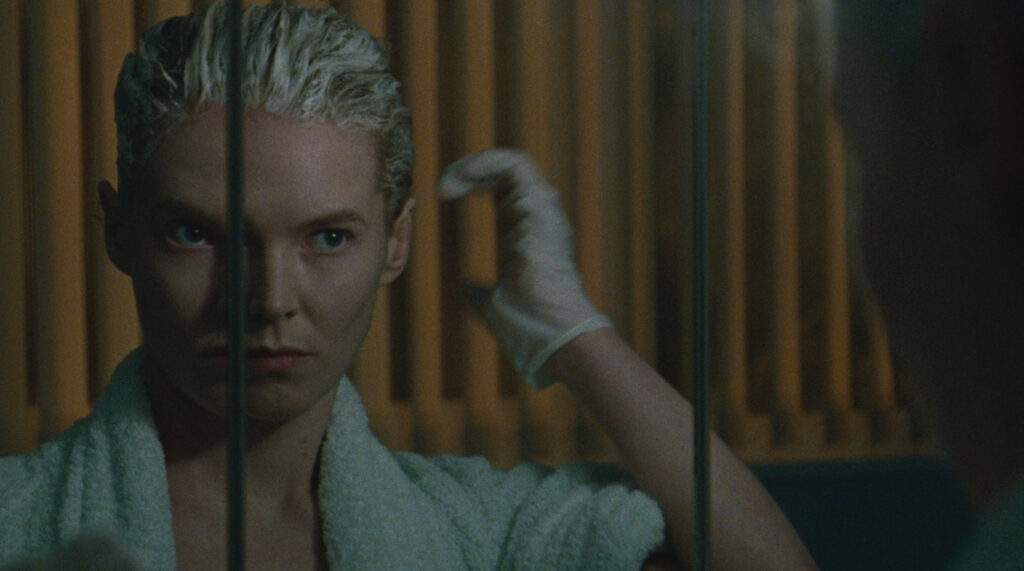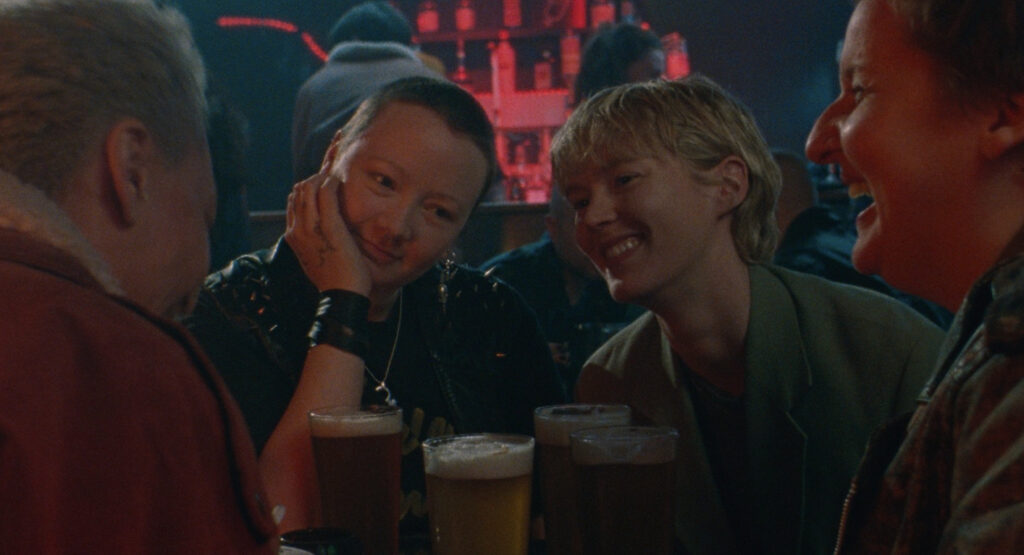
@Blue Jean Production
Synopsis : England, 1988 — Margaret Thatcher’s Conservative government is about to pass a law stigmatizing gays and lesbians, forcing Jean, a gym teacher, to live a double life. As pressure mounts from all sides, the arrival of a new girl at school catalyzes a crisis that will challenge Jean to her core. The Film won the People’s Choice Award at the Venice Film Festival, 4 British Independent Film Awards, and BAFTA nominee.
Genre: Drama, Lgbtq+
Original Language: English
Director: Georgia Oakley
Producer: Hélène Sifre
Writer: Georgia Oakley
Release Date (Theaters): Limited
Runtime:
Distributor: Magnolia Pictures
Production Co: Great Point Media, Kleio Films, BFI Film Fund, BBC Film

Rosy McEwen in BLUE JEAN, a Magnolia Pictures release. © Blue Jean Productions Ltd. Photo Courtesy of Magnolia Pictures.
Exclusive Interview with Director Georgia Oakley and Lead Actress Rosy McEwen
Q: How did this story come about? And please also talk about the section 28, law that Margaret Thatcher brought in 1988. How did that impact English society back then?
Georgia: I was thinking about the themes of the movie so internalized homophobia and the fact that, as queer folk, we are pushed to make our whole life a juggling [act]. Sometimes they splinter off identities and straddle different worlds. It’s breaking up around them and I was looking for a film through which we could explore those things. Around that time, I found out about this law, section 28, which I hadn’t previously known about before.
It said that it was illegal to promote homosexuality in schools and local governments. It was a law in the UK from about 1988 to 2003. It was very similar to the “Don’t Say Gay” bill in Florida for context. It meant that teachers and students alike were unable to discuss any issues surrounding homosexuality. Books that had any reference to homosexuality were taken out of the curriculum. Any teacher that was found discussing their own sexuality, if they were homosexual, likely would lose their jobs. That was the feeling anyway at the time.
Q: Rosy, your character showed a sensitivity to the students, and sister’s kid, a nephew as well. You also has a very passionate bond with the character played by Kerrie [Hayes]. How did you collaborate with her to create that dynamic in your performance?
Rosy: We had a week of rehearsals before we started filming and Georgia sent us off together to develop our characters’ back stories. Just us the two, which I think really helped us bond. I also think me and Kerrie got on as people. Obviously that really helps because you reach some kind of your own language. Georgia sent us off one time to a gay bar in costume in Newcastle.
I felt my way out as Jean in that kind of world without the pressures of lines or cameras. It felt like our dynamic was quickly born and, isort of grew throughout the shoot. Although we found something at the beginning, it continued to grow right until the end. I think the final scene we did together was the breakup scene. That was when it was sort of realized as a couple.
Q: Georgia, you brought up instinct at the beginning of the film. Jean talks about how people respond by instinct before your brain even thinks about it. Homophobia is carefully depicted throughout this film. How did you construct this?
Georgia: I wanted to look at the homophobia, yes, but also at this barrage of hetero-normative messaging that everyone experiences even now, these many years later. If you go on most children’s shows on Netflix, you’re bombarded by the way that life should look — and it looks one way. That is still very much a reality. I wanted to, essentially, when you talk about the kind of fight or flight response that’s shown at the beginning of the film, it touches on that.
The way I see it is that if you grow up in a world completely devoid of role models where you are shown that there is only one way to be and that you don’t fit into that mold. It is essentially, over time, a sort of sustained form of trauma. If you go through trauma in life, you can be locked into a fight or flight response. That was something that was definitely part of the characterization of Jean — what it feels like to be told over and over again that you don’t fit into the world and therefore something about you is inherently wrong; what does that do to you over time and how does that affect your response to everyday situations.

Lucy Halliday in BLUE JEAN, a Magnolia Pictures release. © Blue Jean Productions Ltd. Photo Courtesy of Magnolia Pictures.
Q: Georgia, you did research with PE teachers who taught in the ’80s and early ’90s. Were there any surprises you found by talking to them?
Georgia: It was fascinating talking to them. One thing that was really memorable early on was that the experiences they had had 30 some years ago are very similar to the experiences Jean has in the film. It often left them with a huge sense of regret and shame over the ways that they had been forced into behaving — that really formed the cornerstone of the story. I love looking at complex, sometimes flawed, characters who are pushed because of circumstances — whatever the situation is at the time — to behave in certain ways and to look at that under a microscope and ask why they might be pushed to behave that way.
Hopefully in doing so, it creates empathy with audience members who might not have given that person’s life a second thought. That’s what draws me to storytelling. Definitely that’s the most memorable thing about speaking to those teachers who were not just part of the research phase; they stayed and were very much a part of the whole process throughout. They were with us when we filmed it and when we screened it. The most memorable part of speaking to them was the emotion they carried with them so many decades later. It was so close to the surface and often they would find themselves bursting into tears when telling us about something that had happened to them they hadn’t thought about for a really long time. It was through these conversations that we decided this was an important story that needed to be told and needed to be told now.
Q: Rosy, talk about working with Lucy Halliday who played Lois. She gives such a forceful performance. How did you interact with each other?
Rosy: Hundreds of tapes were sent in. She was picked from a tape and street cast then she came down for a chemistry read. We met this adorably talkative chatty light girl who, the moment she performed as Lois, switched into this hardness and it was like, in the room, the light went off. We all knew that she was the right person and brought that to set every single day. Although we only started hanging out towards the end, the moment the camera started rolling, she snapped into [this character with] fire. She’s incredible.
Q: Georgia, how did you decide to set this story in Newcastle rather than London or Manchester?
Georgia: It became quite clear that our story was going to be set in the north of England because there was quite a clear North/South divide between the stories of women we spoke to during the research phase. There were lots of discrepancies in those stories. We also spoke to drama teachers, history teachers, English teachers who had very different experiences from the lesbian PE teachers we’d spoken to for obvious reasons. So when we decided that we would be focusing on a PE teacher, we then focused on two brilliant women, Catherine and Sarah.
They were both teaching in the north of England around the time that the film is set. It became very clear that this was our story and it would be set in the north of England. I didn’t set it in Manchester because it was the queer capital at the time. It had this kind of rich queer history that I felt would have meant that Jean’s story would have been a little bit less likely. I wanted her to be on the fringes of something. She lives in the suburbs of Newcastle, on the coastal side. She’s quite far away from the queer epicenter of that city.
Q: This film is complex and nuanced, where the dialogue is very important, but at the same time, it also depends on her expression as well. How did you balance that out, those expressions with the dialogue?
Rosy: Jean is so good at pretending and she’s had a lifetime of pretending. She had to be so good at it. Her struggle runs so deep. It’s so layered. It’s so far inside of her because she spent the last 30 years of her life pretending to be something else. So it had to be subtle, but it was also reaching a sort of crux point as well a breaking point. For me, it was a very deep set at the beginning, but it slowly started to bubble up and then it couldn’t leave. Ultimately, the expressions had to be very small and subtle but layered because of the history that she had had.
Georgia: It was always going to be a story that was very internal. It’s a secret battle that she’s going through. It was important to find an actor who could carry the entire film. She’s in every scene and has to communicate so much with not so much dialogue, not so much reliance on dialogue anyway. For me, it was about casting really and finding Rosy was such a joyous experience because I knew that she would be able to [bring it to life]. I’ve been asked many questions about the character during development. How will people know, how will we be on board with the decisions that she makes? I just knew that it was possible, but I didn’t know if I would find somebody who would be able to carry out all these ideas that I had. Finding Rosy, was the… Well, the film wouldn’t have been possible without her.

Kerrie Hayes and Rosy McEwen in BLUE JEAN, a Magnolia Pictures release. © Blue Jean Productions Ltd. Photo Courtesy of Magnolia Pictures.
Check out more of Nobuhiro’s articles.
Here’s the trailer of the film.

